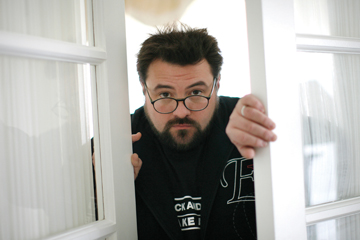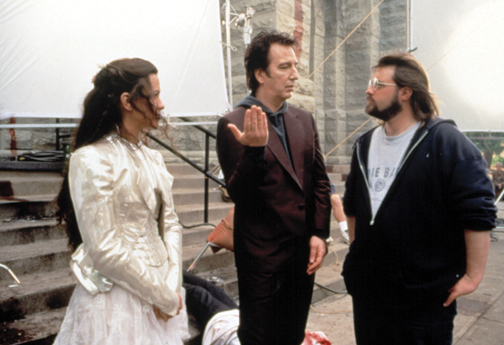BY GLENN KENNY
 ACCIDENTAL VISIONARY: Smith opened the door for today's gleefully vulgar
ACCIDENTAL VISIONARY: Smith opened the door for today's gleefully vulgar
comedies that would have been unimaginable without his precedent.
(Photo Credit: Mario Anzuoni/Reuters/Corbis)Relatively late into a conversation with Kevin Smith, whose ultra-low budget 1994 debut Clerks immediately established the director/writer/actor as a comedy force to be reckoned with, I pose the standard question about just where he got his sense of humor.
"Were you the kind of kid who was funny from an early age? Or was your sense of humor, your verbal wit, something you developed out of..."
"Being fat and shit?" Smith cuts off the question, not defensively, but genially. And not with any particular impatience either; one can imagine that it's an area he's thought about at some length. "You know, I was never class clown, I was never the one in school that everyone said, 'that's funny, dude.'"
Rather, his sense of humor developed slowly, hanging around with friends who laughed at the same weird things, and, much to everyone's surprise, his humor found an outlet in Clerks, a foul-mouthed, groundbreaking comedy about a couple of losers working in a New Jersey convenience store. It's not like he ever planned on becoming a director. The do-it-yourself ethos that fueled Clerks suggested that he took on that particular role just because he could, or had to. It was definitely a case of on-the-job training.
"I would just set up the camera and let [stuff] happen in front of it, because that's what [Jim] Jarmusch did in Stranger Than Paradise. Or at least, that's what I thought Jarmusch was doing in that film. Of course, in his film it's actually very deliberate; a very specific thing, and very composed. He makes it look effortless."
Smith admits Clerks was a fantastic calling card movie, "but it's funny," he says, "because I look at it now and it's really tough—which is so weird because it gave me everything. I look at it now and I'm just like, 'Man, I want to re-shoot that.' I didn't know what to do with the camera. There's no coverage whatsoever."
Smith says it took him 15 years to get better at his job. "I dropped out of film school very early on—it wasn't a real film school anyway, it was just a program—so, in a way, I've been publicly going to film school and getting paid for it, which rocks. But it also means that a lot of people end up seeing your stuff, warts and all."
Still, Smith is surprisingly sensitive to the critical brickbats that have come his way over the years about his visual style, or perceived lack thereof. "I remember one review of Dogma that said I was inconsistent with the size of Linda Fiorentino and Alan Rickman's close-ups. That fucked me up so bad for the rest of my life that every time I do coverage, I'm in there with a fuckin' ruler."
More critical than how they looked, the important thing for Smith has always been to make his movies funny, or what he thought was funny. "The thing about comedy is, if it works, it works, and it works when you get the laughs," he explains. "I'm married to a woman who never laughs at [my stuff], but we're watching a sitcom and somebody does a banana peel pratfall, and she's guffawing. I just want to brain her, I just want to say, 'Are you high? You're going to sit next to me and laugh at something that banal?' But that's what comedy is. It's so subjective."
That said, Smith still thinks his last film, Zack and Miri Make a Porno, is funny and looks really good. "It actually irritated me when I saw one review that said, in effect, 'It's a Kevin Smith film, so of course it's not much to look at.' I'm thinking, come on, dude. I buy that, maybe, for four of my movies ago, but not this one. Do your homework a little more."
At this point in his career, Smith definitely feels like he has something to prove as a director. So his next film, A Couple of Dicks, starring Bruce Willis and Tracy Morgan, is an eyebrow-raising game changer. Firstly, it's not from a script he wrote himself, and secondly, he's making the film for Warner Bros.—the only time in his career except for Mallrats in 1995 and Dogma in 1999 that Smith is directing a feature without Harvey and Bob Weinstein behind it (initially at Miramax and later at the Weinstein Company).
There's a reason for the shift in direction. Smith will be the first to tell you that he considers himself one of the luckiest humans on the planet. "I've been essentially telling whatever story I have to tell completely unhindered for the last 15 years. I've made more money than I ever thought existed in the world." Still, he is prone to disappointment. The box-office take of Zack and Miri—a little over $30 million in the U.S.—prompted Smith to pronounce himself a victim of the "$30 million curse," as none of his films have grossed much beyond that. And considering that Judd Apatow has been making much bigger money directing, producing and writing verbally dexterous and gleefully vulgar comedies that would have been unimaginable without the precedents Smith set with such films as Clerks and Chasing Amy, it may have been time for a change.
 THE WHOLE TRUTH: Smith plans a shot with Alanis Morissette as God and
THE WHOLE TRUTH: Smith plans a shot with Alanis Morissette as God and
Alan Rickman as an angel in Dogma. It was a film, Smith says, that looked
better than critics gave it credit for. (Credit: Miramax/Everett Collection)The Apatow movies also turned Seth Rogen into a star, and it was presumed that Rogen would bring some kind of box-office coattails to Smith when he signed on as the male lead for Zack and Miri. Didn't happen. "Somebody described the situation this way: my films opened a door for Judd, and then Judd opened a window for me. It was very reciprocal. I got something out of it. I wish I was him though, because he figured out how to make it commercial. He mainstreamed the idea of the R-rated comedy. It's the same [stuff] I've been doing my whole life. He figured out how to make it gross $100 million."
But human nature and business considerations aside, making a studio comedy presented a welcome directing challenge for someone who was once the barest of barebones filmmakers. With the exception of a 2007 episode of the TV supernatural comedy Reaper, Smith had never directed a script he hadn't written before. "But after I did that Reaper episode, I really felt that I had brought something to it, that it was better because I had been involved. And it made me want to try something similar with a theatrical feature. So when this came along, it was ideal, for a lot of reasons.
"On this picture, I'm working again with Dave Klein, the guy who shot my first three movies and my last two," Smith goes on. "For the longest time, Miramax wouldn't let us hire him—they were insistent, 'You got to get with another DP who's going to make your stuff look better.' It took them a bunch of movies to understand that what they were getting was just how I composed. I think it really sunk in after Jersey Girl—'Look, we put him with Vilmos Zsigmond and he still [messes] up!' But after I got back together with Dave, I kind of blossomed. Partly because he's a guy I can talk to.
As he prepares to shoot in New York, Smith remains a little vague about the specifics of the film—a cop buddy comedy with, yes, some action scenes, something he's never really tried before (unless you count the business with the donkey in Clerks II)—but his excitement about it is obvious. "It's a very funny script, about a couple of cops who have been partners for years. And it made me think, among other things, 'Wow, this is the kind of movie my father would have taken me to see. Like, straight up my old man's alley,'" Smith enthuses. "Everyone involved feels the same way: we just want to make that movie. As in, for the rest of our lives at 3 o'clock on a Saturday afternoon, when you turn on TNT, A Couple of Dicks is on. We want it to be the kind of movie that goes into every rotation and that people just embrace, like a Lethal Weapon, or even something like Road House."
Smith seems to catch himself, and pauses. Then adds: "Although you'd want to do more business than Road House."